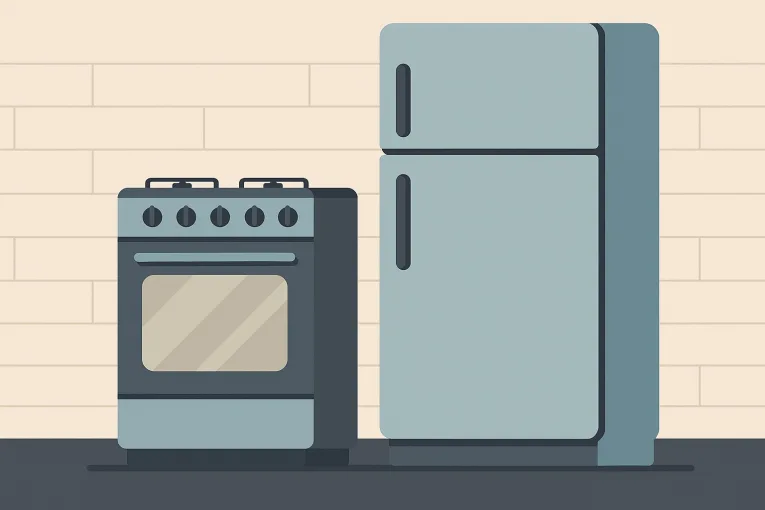
SACRAMENTO, Calif. — A new bill moving through the California State Assembly would require landlords to include a functioning stove and refrigerator in all new, renewed, or amended residential leases beginning in 2026—marking a major shift in what’s legally considered a “habitable” rental unit in the state.
Assembly Bill 628, authored by Assemblymember Tina McKinnor (D-Inglewood), aims to modernize state housing standards by recognizing basic appliances not as amenities, but as essential components of livable housing.
“A working stove and a working refrigerator are not luxuries—they are a necessary part of modern life,” McKinnor told colleagues during a recent committee hearing. “California’s rental housing affordability crisis has been worsened by outdated laws that don’t recognize that.”
While many landlords already include these appliances, McKinnor and tenant advocates say a growing number of rental properties—particularly in high-cost areas—are leasing units without them, forcing tenants to shoulder significant upfront costs on top of already unaffordable rents.
“In my district, a two- or three-bedroom apartment can go for $3,000 to $4,000 a month,” McKinnor said. “When a tenant has to pay first and last month’s rent, that’s around $6,000 just to move in—before buying a stove and fridge.”
If enacted, AB 628 would update California’s Civil Code to require that all leases signed, amended, or extended on or after January 1, 2026, include:
- A stove in good working order that safely generates heat for cooking;
- A refrigerator in good working order that can safely store food.
The bill clarifies that recalled appliances do not meet this standard, and it allows tenants to opt out of receiving a refrigerator if they choose to bring their own.
Notably, the bill exempts certain types of housing where individual kitchen appliances are not standard or practical, including:
- Permanent supportive housing for formerly unhoused individuals;
- Single-room occupancy units (SROs) and residential hotels;
- Senior living facilities and other housing with shared kitchen space.
The bill initially faced opposition from groups such as the California Housing Consortium and Housing California, which raised concerns about waste and affordability—especially a now-removed provision that would have required appliances to be less than 10 years old.
That provision has since been dropped in response to environmental and cost concerns. Advocates say this compromise preserves the bill’s intent while avoiding unnecessary financial burdens for landlords, especially those operating affordable housing units.
The California Rural Legal Assistance Foundation is among the supporters of the bill, arguing that in a state already suffering from a severe housing crisis, no tenant should be expected to pay extra for the ability to store or cook food in their home.
“Most people would not consider a rental unit habitable without a stove and refrigerator, and the law should reflect that,” the foundation wrote in support.
Currently, California law requires landlords to provide basic necessities like plumbing, heating, hot water, and electricity—but not appliances. AB 628 would bring California more in line with tenant expectations and modern living standards.
The bill passed the Assembly Judiciary Committee by a vote of 9-1 and is expected to move forward this session.
If signed into law, AB 628 could significantly improve housing conditions for low-income renters while creating a more uniform standard across the rental market.
I’m surprised they didn’t try to require the stoves to be electric
I see nothing wrong with this as written. I had assumed habitability already included these two appliances, and that should be a basic.
At $3000-$4000/month, though, this apparently isn’t about low income persons, but possibly housing-poor persons with a big chunk of their income in rent.
I don’t much care either way on this.
But you do know that many/most landlords will adjust their rents upward if they have to buy and maintain appliances.
I have never rented a place without a fridge or stove and most have had dishwashers too. And If I’m paying $3000 a mo, it sure as hell should have one.
Darn tootin’.
Might want to have an air conditioner in this area, as well. Tariffs or not.
Yes, I sure as Hell agree.
But my point, that you appear to have dismissed, is if a landlord has to go out and buy appliances and keep them maintained that didn’t provide appliances in the first place “many/most” of them will also up the rent.
My point is they already are doing that. Also, given the usable life of appliances, the monthly increase is going to be extremely marginal. Let’s say an appliance is 1000 dollars (on the high end) and lasts just 80 months, that’s $12.50 per month.
I had an employee many years ago who was living in transitional housing and working for us as part of that program. Her stove stopped working and the landlord refused to fix it. She couldn’t afford to, nor could she afford to move. So she just stopped cooking food. We learned about this after several weeks and encouraged her to press for getting the appliance fixed, which eventually happened. But she had no particular leverage to get it done. That’s why laws like this come about.
That makes sense
I agree, was just trying to dispel Keith of the notion that this was going to add real cost to rent